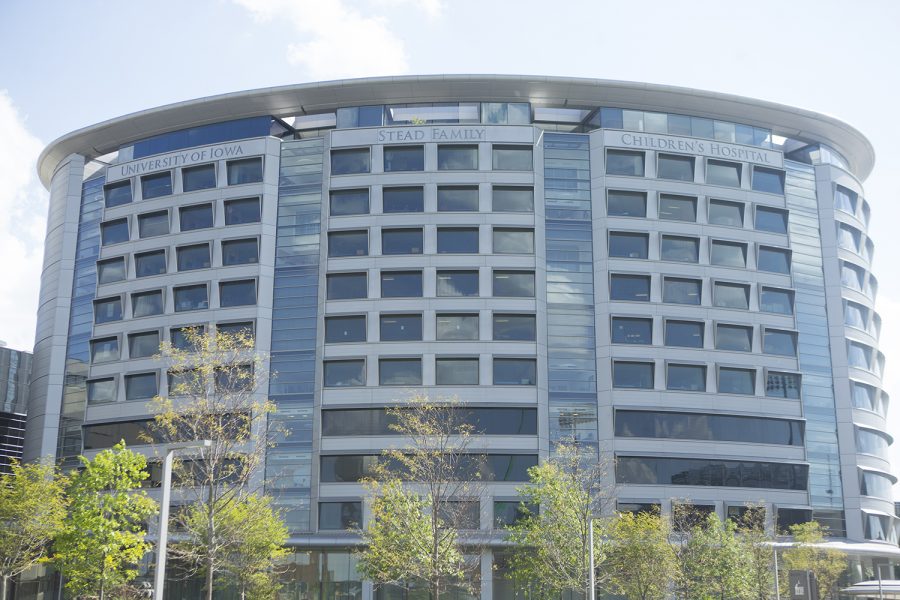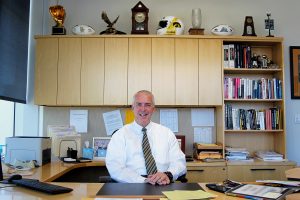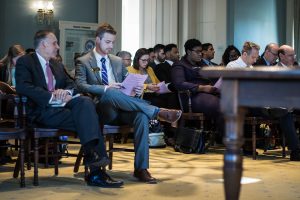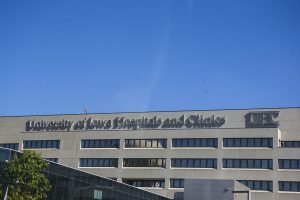Soon to expand, program helps young cancer patients in unique ways
Cancer patients ages 13 to 39 have a unique set of needs as they go through treatment. The Adolescent and Young Adult Cancer Program at Holden strives to meet those needs and make difficult times a little easier as patients go through treatment.
The Stead Family Children’s Hospital is seen on on Saturday, Sept. 23, 2017.
October 22, 2018
Battling cancer from teenage years into early adulthood comes with unique obstacles. The Adolescent and Young Adult Cancer Program at the University of Iowa Holden Comprehensive Cancer Center strives to address those obstacles and relieve the stress.
Starting in January 2019, AYA will expand to serve all types of cancer for patients ages 13 to 39. Officials increased the age range to reach more people, said William Terry, a UI clinical professor and AYA medical director.
“AYA is pretty new, and it combines the Children’s Hospital and the cancer center. It’s a unique program that’s doing great things,” said Scott Hansen, the Holden executive director of development.
AYA works with cancer patients at the UI Hospitals & Clinics through treatment into survivor status.
Launched in May 2017, AYA started by serving patients ages 13 to 31 with five different cancer types: thyroid cancer, brain tumors, leukemia/lymphoma, sarcoma, and neuroendocrine, Terry said. These cancer types had experts in both adult and pediatric oncology available at Holden.
Terry was hired in October 2015 to not only continue his career in pediatric oncology but to take over the newly formed AYA program, too.
“I was super excited because, from my experience, I knew that patients in this age group really had other needs that nowhere else in the country was able to address,” Terry said. “It’s important, and many places aren’t able to do it with the structure they have in their institutions. Coming to a place like Iowa, where you have community support, institutional support, and a lot of people eager to worktogether was really exciting to me.”
RELATED: Big Ten schools team up to fight bladder cancer
AYA provides services to patients such as clinical trials, fertility, coordinated clinical care, genetic counseling, pain and palliativecare, supportive services, and survivor planning, Terry said.
Two programs AYA focuses on are fertility planning and psychosocial support, he said. Fertility planning allows patients to see how their cancer treatment will affect their ability to have children in the future and form a plan.
Psychosocial support provides peer-to-peer networks and social support and addresses what may come after treatment as patients transition to survivors, he said.
“We know that more than 50 percent of patients going through cancer are going to have increased levels of distress, anxiety, and social isolation,” Terry said. “Trying to address some of those psychological needs of patients is something we have recognized as really important and continue to transition them on to life after cancer and survivorship. We can make sure anything that happened to them during their treatment, those physiological side-effects, are addressed.”
Margaret McCaffery’s passion for pediatric cancer treatment and care began after one of her sons went through it. She and her family were asked to help kick-start fundraising and raise awareness for AYA.
They eagerly jumped on board and now help with several fundraisers every year, including an event each fall that raises nearly $180,000 annually.
“It’s unique to have people from the cancer center who focus on adult patients and the pediatric oncologists to be willing to collaborate the way they do and bridge those gaps; to advocate for their patients and care for them in the ways they do,” McCaffery said. “It’s an incredibly important endeavor the university has taken on, and we are proud to be a part of it.”






